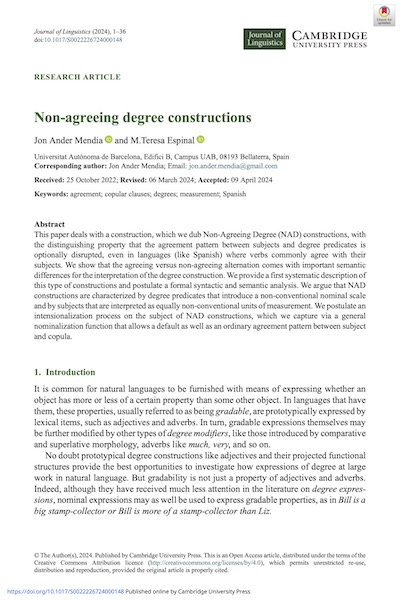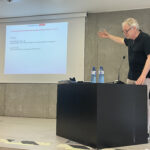2 setembre, 2022

Autors:
Jon Ander Mendia
Títol:
Structural Effects on Implicature CalculationEditorial: Journal of Semantics, Oxford University Press
Data de publicació: 7 abril 2022
Més informacióThis paper provides an investigation of Ignorance Inferences by looking at the superlative modifier at least. The formal properties of these inferences are characterized in terms of the epistemic conditions that they impose on the speaker, thereby establishing how much can and must be inferred about what the speaker is ignorant about. The paper makes two main contributions. First, it argues that the form of these inferences depends solely on the structural properties of the expression that at least is modifying, which do not necessarily coincide with semantic entailment. Rather, rank and order seems to matter: with totally ordered associates, at least triggers Ignorance Inferences that may be formally different than those obtained with partially ordered associates (Mendia (2016b)). Second, it builds on neo-Gricean double alternative generation mechanisms (like Schwarz (2016)) arguing that one of them must be provided by focus.
4 juny, 2024

Autors:
Jon Ander Mendia & Maria Teresa Espinal
Títol:
Non-agreeing degree constructionsEditorial: Journal of Linguistics (Cambridge University Press)
Data de publicació: Online: 4 juny 2024
Pàgines: 36 Text completThis paper deals with a construction, which we dub Non-Agreeing Degree (NAD) constructions, with the distinguishing property that the agreement pattern between subjects and degree predicates is optionally disrupted, even in languages (like Spanish) where verbs commonly agree with their subjects. We show that the agreeing versus non-agreeing alternation comes with important semantic differences for the interpretation of the degree construction. We provide a first systematic description of this type of constructions and postulate a formal syntactic and semantic analysis. We argue that NAD constructions are characterized by degree predicates that introduce a non-conventional nominal scale and by subjects that are interpreted as equally non-conventional units of measurement. We postulate an intensionalization process on the subject of NAD constructions, which we capture via a general nominalization function that allows a default as well as an ordinary agreement pattern between subject and copula.







